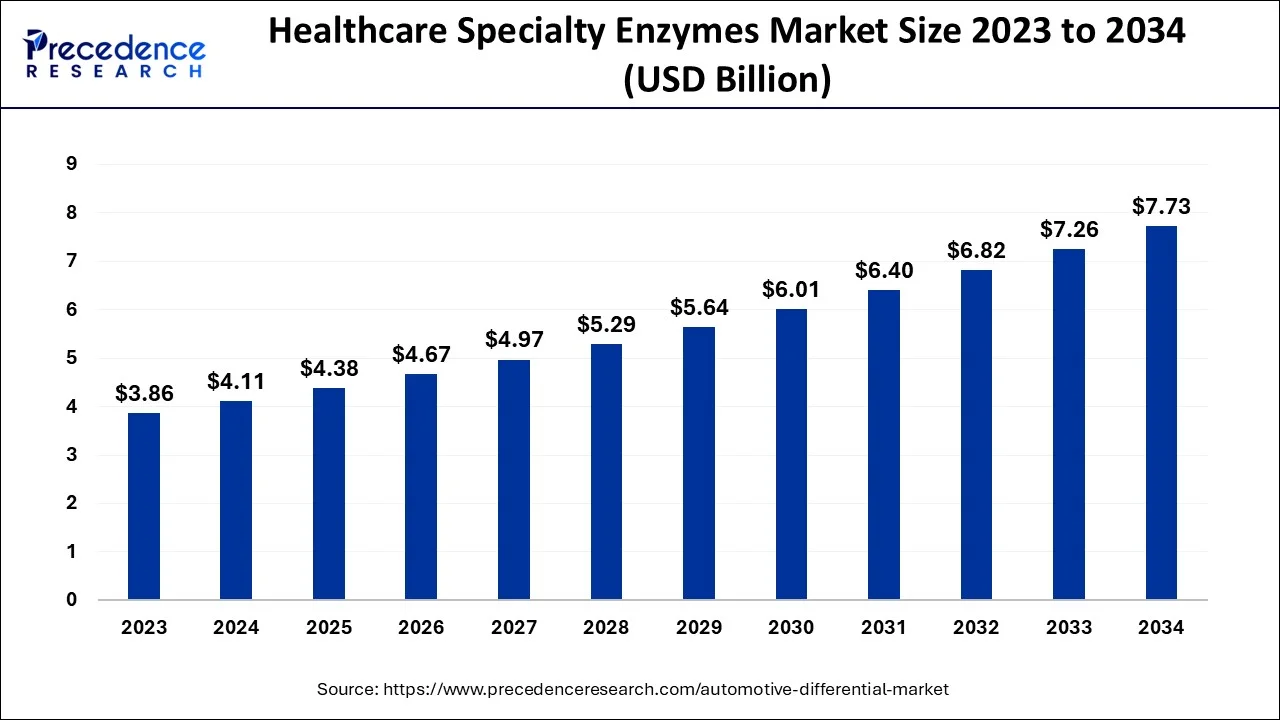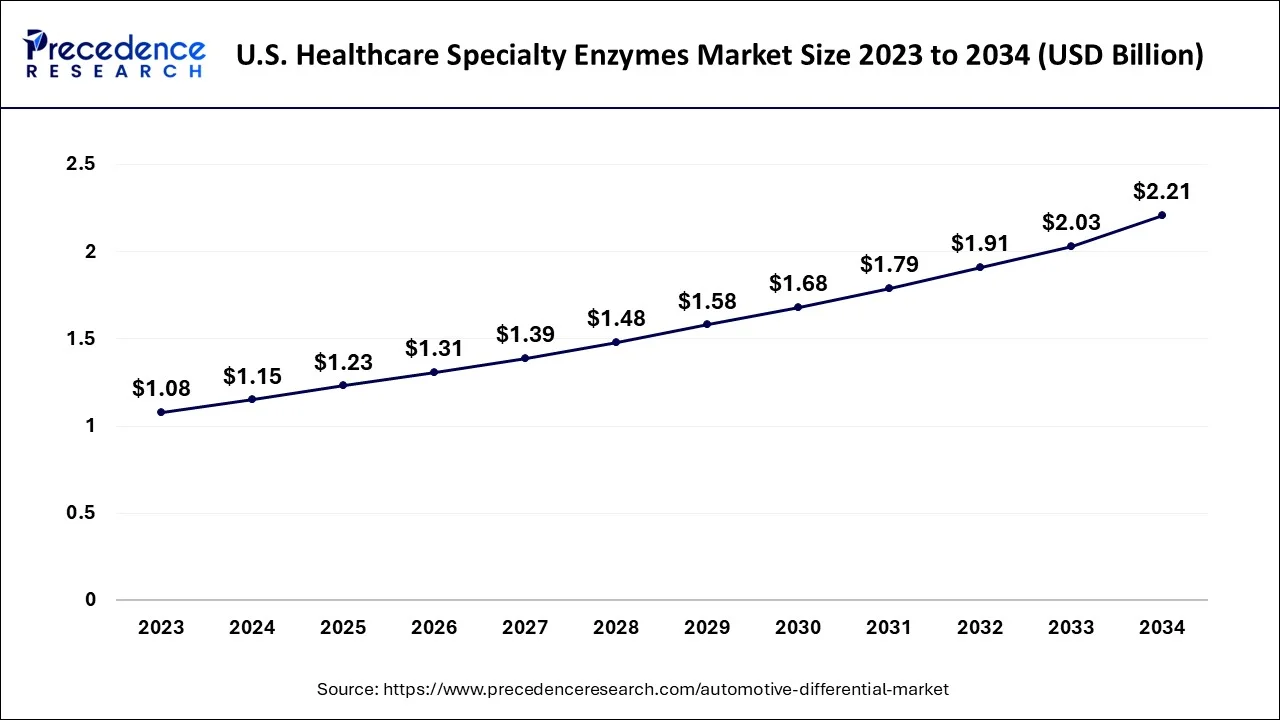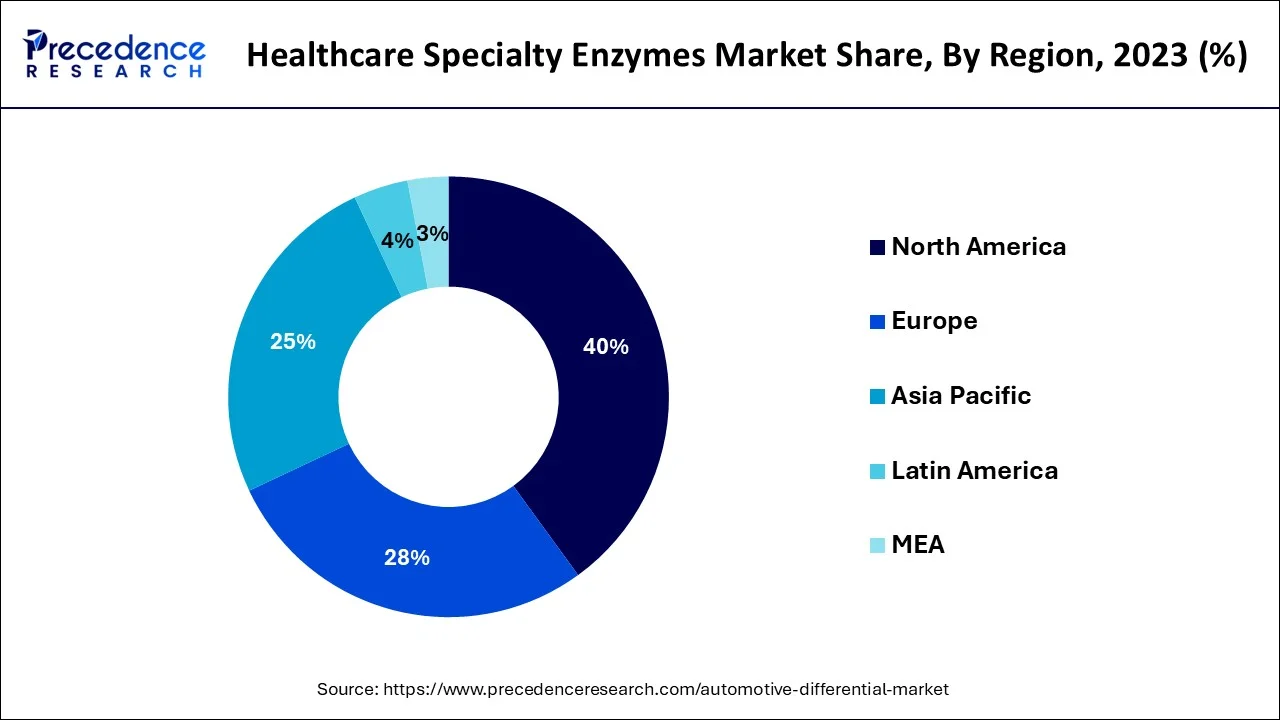List of Contents
Healthcare Specialty Enzymes Market Size and Forecast 2024 to 2024
The global healthcare specialty enzymes market size is estimated at USD 4.11 billion in 2024 and is anticipated to reach around USD 7.73 billion by 2034, expanding at a CAGR of 6.52% between 2024 and 2034.

Healthcare Specialty Enzymes Market Key Takeaways
- North America holds the dominating share of around 40% in 2023.
- Asia Pacific will witness the fastest growth during the forecast period.
- By type, the protease segment is expected to have a noticeable share of the market from 2024 to 2034.
- By source, the microbial segment led the market in 2022, and the animal segment of source will witness rapid growth.
- By application, the infectious disease segment dominated the market in 2023, and the oncology segment of application will witness a significant from 2024 to 2034.
U.S. Healthcare Specialty Enzymes Market Size and Growth 2024 to 2024
The U.S. healthcare specialty enzymes market size was valued at USD 1.15 billion in 2024 and is predicted to be worth around USD 2.21 billion by 2034, growing at a CAGR of6.75% from 2024 to 2034.

North America acquired the largest share of the market in 2023, the region is expected to sustain its position during the forecast period.North America has a well-established healthcare infrastructure with advanced research facilities, pharmaceutical companies, and diagnostic laboratories. This provides a conducive environment for the development, manufacturing, and utilization of healthcare specialty enzymes. he region has a high prevalence of chronic diseases such as cancer, cardiovascular disorders, and metabolic diseases. Specialty enzymes play a significant role in the diagnosis, treatment, and management of these conditions, driving the demand for healthcare specialty enzymes.
North America is known for its technological advancements and innovation in the healthcare sector. The region has a strong focus on research and development, leading to the development of novel specialty enzymes and their applications in diagnostics, therapeutics, and research.
Major players in the North America healthcare specialty enzymes market include companies involved in enzyme manufacturing, pharmaceuticals, biotechnology, anddiagnostic testing. These companies develop and produce specialty enzymes, as well as offer related services and solutions to healthcare professionals, research institutions, and diagnostic laboratories.

Asia Pacific is expected to witness the fastest growth in the global healthcare specialty enzymes market.Asia-Pacific is experiencing significant growth in healthcare expenditure, driven by increasing population, rising disposable incomes, and improving healthcare infrastructure. This leads to higher investments in advanced medical technologies, including specialty enzymes, supporting market growth. Many countries in the Asia-Pacific region are placing a greater emphasis on research and development activities in the healthcare sector. This includes advancements in biotechnology, genetic research, and personalized medicine, where specialty enzymes find extensive applications. The focus on R&D contributes to market growth by driving innovation and the development of new enzyme-based products and solutions.
Governments in the Asia-Pacific region are implementing initiatives to promote the growth of the healthcare industry, including biotechnology and research activities. Supportive policies, funding programs, and collaborations between industry and academia create a favorable environment for the development and utilization of healthcare specialty enzymes.
For instance: the Chinese government has been actively promoting the development of the healthcare and biotechnology sectors, including specialty enzymes. They have implemented various initiatives and policies to support the research, development, and commercialization of healthcare specialty enzymes.
Market Overview
The healthcare specialty enzymes market refers to the segment of the healthcare industry that focuses on the production and utilization of specialized enzymes for various medical applications. Enzymes are protein molecules that act as catalysts in biochemical reactions, accelerating the rate at which these reactions occur.
healthcare specialty enzymes are specifically designed and engineered for use in medical and clinical settings. They have unique properties that make them suitable for a wide range of applications in healthcare, including diagnostics, therapeutic treatments, research, and biotechnology.
These enzymes are used in various medical fields, such as pharmaceuticals, biotechnology, diagnostics, and research laboratories. They play a crucial role in areas such as drug development, personalized medicine, genetic engineering, and molecular biology.
Healthcare Specialty Enzymes Market Growth Factors
The healthcare specialty enzymes market is driven by advancements in biotechnology, increased understanding of enzymatic processes, and growing demand for personalized medicine and targeted therapies. Companies in this market develop and manufacture specialty enzymes, as well as provide related services and solutions to healthcare professionals and researchers.
The rising prevalence of chronic diseases, such as cancer, cardiovascular disorders, and metabolic disorders, has created a substantial demand for advanced diagnostics and therapeutic solutions. Specialty enzymes find application in diagnostics, drug development, and treatment of these conditions, driving market growth.
Market Scope
| Report Coverage | Details |
| Market Size in 2024 | USD 4.11 Billion |
| Market Size by 2034 | USD 7.73 Billion |
| Growth Rate from 2024 to 2034 | CAGR of 6.52% |
| Largest Market | North America |
| Fastest Growing Market | Asia Pacific |
| Base Year | 2023 |
| Forecast Period | 2024 to 2034 |
| Segments Covered | By Product, By Source, and By Application |
| Regions Covered | North America, Europe, Asia-Pacific, Latin America, and Middle East & Africa |
Market Dynamics
Driver
Advancements in enzyme engineering across the globe
Advancements in enzyme engineering play a crucial role in driving the growth of the healthcare specialty enzymes market. These advancements contribute to the development of specialized enzymes with improved properties, which in turn expand their applications in healthcare. Enzyme engineering techniques, such as protein engineering and directed evolution, enable scientists to modify enzymes and enhance their specificity and selectivity. This allows for the design of enzymes that can target specific substrates or perform specific functions, making them valuable tools in diagnostics, therapeutics, and research applications.
Enzyme engineering techniques can be used to enhance the stability and resistance of enzymes to various environmental conditions, such as temperature, pH, and proteolytic degradation. This enables the development of enzymes that can withstand harsh conditions encountered in medical procedures or industrial processes, expanding their utility in healthcare settings. These advancements expand the range of applications for healthcare specialty enzymes, driving market growth and fostering innovation in the healthcare industry.
Restraints
Lack of standard regulations
The lack of standardized regulatory requirements and harmonization will impede the market growth for enzymes. Without clear regulatory guidelines, companies developing healthcare specialty enzymes may face uncertainties in the product development process. The lack of standardized requirements or benchmarks for safety, efficacy, and performance can lead to delays, higher costs, and increased risks in bringing new enzyme products to the market. This can discourage innovation and limit the growth potential of the market.
In the absence of standard regulations, ensuring consistent quality and safety of healthcare specialty enzymes becomes challenging. Quality control measures, such as manufacturing practices, product testing, and validation, may vary among different manufacturers or regions. This lack of standardization can hinder trust and confidence in the market, making it difficult for healthcare professionals and researchers to select and utilize specialty enzymes. Thus, the lack of standard regulatory guidelines is observed to act as a major restraint for the market's growth.
Opportunities
Demand for preventive medicine increases
The rising demand for personalized medicine presents significant opportunities for the healthcare specialty enzymes market. Personalized medicine relies on genetic testing to identify specific genetic variations that influence an individual's response to treatment. Specialty enzymes play a crucial role in DNA sequencing, genotyping, and other molecular diagnostic techniques. They enable the accurate and efficient analysis of genetic information, allowing healthcare professionals to tailor treatment plans based on individual genetic profiles.
The growing demand for personalized medicine drives increased research and development activities in the healthcare industry. Specialty enzymes are essential tools in these endeavors, facilitating advancements in genomics, proteomics, and other areas of molecular biology. The development of new and improved specialty enzymes enables researchers to delve deeper into personalized medicine, leading to the discovery of novel diagnostic and therapeutic approaches.
Type Insights
The protease segment had a significant share of the market in 2023, the segment will continue to grow at a significant rate during the forecast period. Protease enzymes are widely used in research and diagnostic applications. They are essential in protein analysis, protein sequencing, and proteomic studies.
Certain protease enzymes have demonstrated anti-inflammatory properties. They can help reduce inflammation by modulating the activity of pro-inflammatory cytokines and chemokines. Protease enzymes, when used as therapeutic agents, can contribute to the management of inflammatory conditions such as arthritis and respiratory disorders.
Protease enzymes play a critical role in the digestion of dietary proteins. They break down proteins into smaller peptides and amino acids, enabling their absorption in the gastrointestinal tract. Digestive enzyme supplements containing proteases are used to support digestion and alleviate digestive disorders such as pancreatic insufficiency.
Source Insights
The microbial segment dominated the market in 2023, the segment is expected to maintain its growth during the forecast period. Microbial enzymes are derived from microorganisms such as bacteria and fungi. These enzymes are widely used in various healthcare applications, including diagnostics, therapeutics, and research. Advantages such as high stability, broad substrate specificity, and ease of production promote the segment's growth.
On the other hand, the animal segment of the source is expected to witness rapid growth. Animal-sourced enzymes often exhibit excellent biocompatibility, meaning they are well-tolerated by the human body. This makes them suitable for various medical applications, including diagnostics, therapeutics, and research. In healthcare, specific enzymes are often required for targeted diagnostic tests or therapeutic applications, making animal-sourced enzymes highly valuable.
Applications Insights
The infectious disease segment held the largest share of the market in 2023, the segment will continue to grow at a significant rate during the forecast period. The sudden outbreak of Covid-19, an infectious virus disease, promoted the significance of healthcare specialty enzymes. Specialty enzymes are essential components in diagnostic tests, including those used for Covid-19 detection. Enzyme-linked immunosorbent assays (ELISAs) and polymerase chain reaction (PCR) tests, which are widely used for Covid-19 diagnosis.
During the pandemic, healthcare specialty enzymes are utilized in the research and development of potential Covid-19 therapeutics. Enzymes play a role in drug discovery, optimization, and formulation processes. The search for effective treatments for Covid-19 led to increased demand for specialty enzymes for drug development purposes.
The oncology segment will witness growth at an exponential rate during the forecast period. The oncology segment shows enormous demand for healthcare specialty enzymes for diagnostic purposes. Specialty enzymes play a crucial role in diagnostic applications related to oncology. The rising requirements for early diagnosis for cancer and the increasing prevalence of the same will promote the segment's growth during the forecast period.
Healthcare Specialty Enzymes Market Companies
- Advanced Enzymes Technologies Ltd
- Amano Enzymes, Inc.
- Amicogen
- BBI Solutions
- biotechrabbit GmbH
- Brain AG
- CPC Biotech
- Creative Enzymes
- EKF Diagnostics
- F. Hoffmann-La Roche Ltd
- Merck KGaA
- Sekisui Chemical Co., Ltd.
- Thermo Fisher Scientific, Inc
Recent Developments:
- In November 2022,a prominent player in enzyme application, Novozymes announced the launch of a consumer-facing health division. With this new launch, the company aims to strengthen its strategic vision for industrial enzyme application.
Segments Covered in the Report:
By Product
- Carbohydrase
- Polymerase and Nuclease
- Protease
- Lipases
- Phosphates
- Others
By Source
- Microbial
- Plants
- Animals
By Application
- Infectious diseases
- Diabetes
- Oncology
- Cardiology
- Nephrology
- Others
By Geography
- North America
- Europe
- Asia-Pacific
- Latin America
- Middle East and Africa
For inquiries regarding discounts, bulk purchases, or customization requests, please contact us at sales@precedenceresearch.com
Frequently Asked Questions
Ask For Sample
No cookie-cutter, only authentic analysis – take the 1st step to become a Precedence Research client